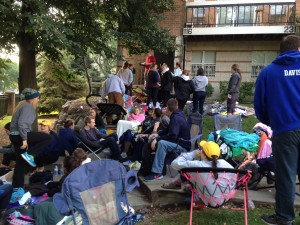
Marquette students camped out in customary fashion last Friday at the Renee Row apartment complex’s courtyard, strewn about in dorm chairs and sleeping bags, eager to sign a lease for the following school year.
For many students, though, this early-semester onslaught of lease signing is cause for much concern.
Jared Wheeler, a sophomore in the College of Communication, was one of the campers at Renee Row, but he did not spend the night out in the cold by choice.
“I did it to fit in,” Wheeler said, wearing the weathered garb of a man resigned to sleeping outdoors. “All the places were going early – way earlier than I expected – so I had to (in order) to get the house I wanted.”
Renee Row, an apartment complex located at 927 N. Renee St., attracts a certain crowd. Beer cans, solo cups and other conspicuous beverage containers littered the courtyard as campers celebrated their future apartments.
But many of these soon-to-be residents have not even had time to tour the units, as they were pressed for time to sign.
Daniel Bergen, the assistant director of off-campus housing, cautioned students to resist the pressure to sign early.
“While it’s true that houses and larger occupancy spaces will move more quickly in the neighborhood, there are a variety of options available throughout the year,” Bergen said in an email. “Students should be intentional about their decisions and take their time – they should view the apartments they are renting prior to signing a lease.”
Still, for students wishing to sign for “larger occupancy spaces,” the pickings are slim, and are only getting slimmer.
Jeffrey Rueth, a junior in the College of Business Administration, is a current resident at Renee Row, but he is looking for something bigger for next year.
“I like (Renee Row,) I haven’t had any problems with it,” Rueth said, “but I wanted a house for next year.”
After searching frantically earlier in the month, he eventually decided on a place near 20th and Wells.
“The house is fine, but it’s not in the best location,” Rueth said. “I just can’t believe we’re late signing for a house when we’re signing nine months early.”
Not only are houses getting signed remarkably early, but there is concern that prices are increasing as well.
“Recent increases in property taxes and rising costs of utilities may be two of the primary contributing elements to the rise of rent rates,” Bergen said. “However, the market remains competitive with a range of prices that include a spectrum of amenities from a basic apartment to fully-furnished units with flat screens and granite counter-tops.”
Although there may be a marginal increase in prices (for instance, a three bedroom, one-and-a-half bathroom apartment at the 2040’s will increase by $5 next year), Bergen wants students to remain calm and consider their options.
The Office of Residence Life is hosting three off-campus leasing information sessions on Family Weekend, Saturday, Oct. 4. Bergen said there will be tours of the University Apartments and a Neighborhood Open House from 10 a.m. to 3 p.m.









Greg • Sep 25, 2014 at 9:21 pm
And here is my challenge to the author and the newspaper – do the research to determine how MU decided to use the process they are using. What are the strengths (or reasons) of the process as is? Is there a better process? Would assigning the lottery times earlier be beneficial? Could technology be used to facilitate the process?
You could even make it a project for the business school to find a better process.
Guest2 • Oct 20, 2014 at 10:12 pm
The problem is that half of this housing is owned by private companies, not Marquette.
Greg • Sep 25, 2014 at 9:16 pm
You can’t blame the kids and you can’t blame the property owners – but IMO you can absolutely place part of the blame on MU.
First thing MU could do is give priority to groups of 4 to live in MU apartments. They provided information a while back that the apartments were all filled but only to about 70% of capacity – meaning people in a 4 person unit were choosing to split the rent between two people.
Second thing they could do is assign the lottery slots at the end of sophomore year – with priority to groups of 4. Not sure why it’s necessary to wait until October – or whenever it is.
Third, they could educate the students more proactively.
All would lessen the demand for external housing and help control prices.